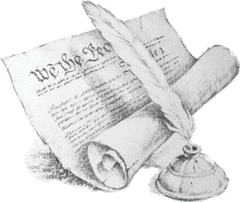NCCS was easy to deal with. Product came quickly and the price was very reasonable.
I received the order in good time. Thank you.
These are perfect for my middle school students. They are small, easy to read, and seem pretty sturdy. We have not used them yet but they appear to be easy to navigate as well.
Thank you for continuing publication of the U.S. Constitution without adding personal bias or agenda. So many disagreements arise from lack of understanding the foundation of our Country. I am only one person, but I am one person and I can acquire copies of the U. S. Constitution and share them, thanks to you.
Simply the most brilliant concept of a free people to govern themselves ever conceived by humankind. Living updatable language to fit the advancing societal order. Described by its authors thusly:
“We the People of the United States, in Order to form a more perfect Union, establish Justice, insure domestic Tranquility, provide for the common defense, promote the general Welfare, and secure the Blessings of Liberty to ourselves and our Posterity, do ordain and establish this Constitution for the United States of America.”






